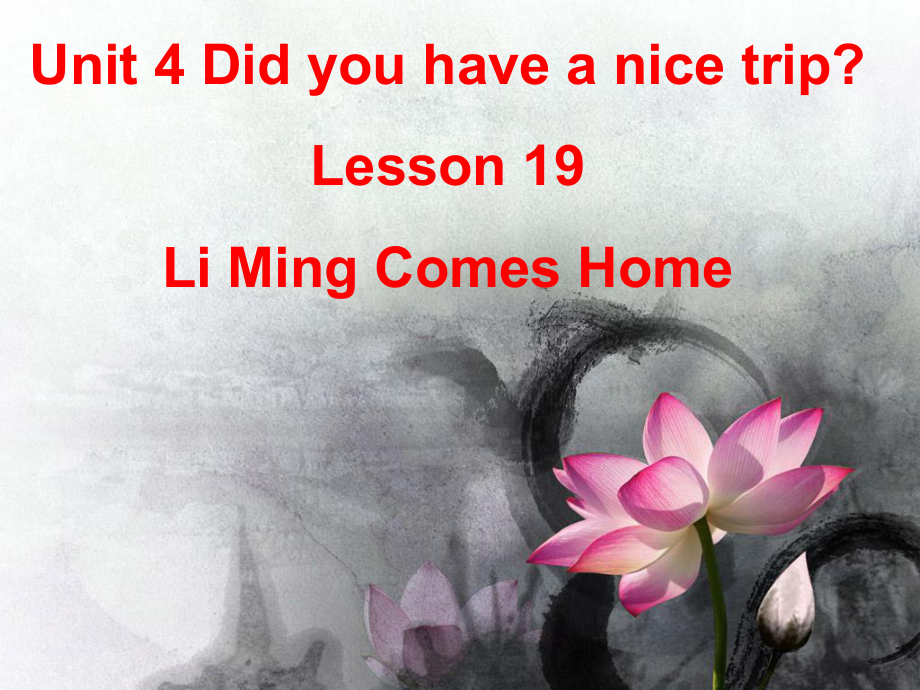《五年級(jí)下冊(cè)英語(yǔ)課件-Unit 4 Did You Have a Nice Trip Lesson 19 Li Ming Comes Home 2|冀教版》由會(huì)員分享,可在線閱讀����,更多相關(guān)《五年級(jí)下冊(cè)英語(yǔ)課件-Unit 4 Did You Have a Nice Trip Lesson 19 Li Ming Comes Home 2|冀教版(19頁(yè)珍藏版)》請(qǐng)?jiān)谘b配圖網(wǎng)上搜索。
1����、Unit 4 Did you have a nice trip?Lesson 19 Li Ming Comes Home 自學(xué)指導(dǎo) 自讀課文第一部分,理解課文����,小組討論,劃出你知道的短語(yǔ)����,并提出你不能解決的問(wèn)題。(用時(shí)3分鐘) I often walk to school.I walked to the park yesterday. I often talk to Miss Zhang.I talked to my cousin yesterday. I often play chess with my parents.I played computer with my friends ye
2����、sterday. I often walk to school.I walked to the park yesterday.I often talk to Miss Zhang.I talked to my cousin yesterday.I often play chess with my parents.I played computer with my friends yesterday. walktalkplay walkedtalkedplayedoften yesterdayWhat can you find? Li Ming arrives home from Beijing
3、. What does his father want to know? Read and listen. Mr. Li Li Ming Mr. Li Li Ming 讀課文回答問(wèn)題1����、Did Li Ming have a nice trip?2、What did Li Ming do?Yes, he did.He walked to Wangfujing Street and shopped there. And he bought a gift for Mr. Li. 1����、接龍游戲����。前一個(gè)個(gè)學(xué)生用過(guò)去式 或現(xiàn)在式說(shuō)出一個(gè)句子����,讓學(xué)生給出其相應(yīng)的現(xiàn)在式或過(guò)去式 句子����。(例如老師說(shuō):Yeste
4、rday, I played.學(xué)生要說(shuō):today, I play.) 當(dāng)這名學(xué)生回答正確時(shí)����,他便可以對(duì)下一個(gè)同學(xué)說(shuō)出句子。today yesterdayplay playedwalk walkedtalk talkedjump jumpedlook lookedpoint pointedlaugh laughedToday,IYesterday,I Name Today yesterdayLily walk to school walked to schoolMike talk to Miss Zhang talked to Miss Zhangme play cards played ca
5����、rds2、閱讀表格����,完成句子。 Name Today yesterdayLily walk to school walked to schoolMike talk to Miss Zhang talked to Miss Zhangme play cards played cards1.What did Lily do yesterday ? She.2.What did Mike do yesterday ? He.3.What did you do yesterday? .walked to schooltalked to Miss ZhangI played cards 一般過(guò)去時(shí)表示過(guò)
6����、去存在的狀態(tài)或過(guò)去的動(dòng)作����,要用一般過(guò)去時(shí)����,在句中常常出現(xiàn)過(guò)去的詞。如:just now, right now, a moment ago, yesterday, the day before yesterday, last month, last year等����。 一般過(guò)去時(shí)的運(yùn)用 (1 ) be動(dòng)詞變成was,were����,其中 am, is was are were (2 ) 行為動(dòng)詞一般加-ed,沒(méi)有人稱����、單復(fù)數(shù)之分。 行為動(dòng)詞的過(guò)去式結(jié)構(gòu): (1 )一般情況下在詞尾加-ed����。 在元音和濁輔音后讀/d/。如: staystayed climbclimbed 在清輔音后讀/t/����。如: workworked looklooked helphelped(2 )以e結(jié)尾的動(dòng)詞加d����,讀音同上����。 likeliked livelived hopehoped (3 )以輔音字母加y結(jié)尾的動(dòng)詞去y加 ied,讀/id/����。如:studystudied trytried carrycarried(4 )以重音閉音節(jié)結(jié)尾����,末尾只有一個(gè)輔音字母的動(dòng)詞,要雙寫(xiě)末尾的輔音字母����,再加ed。讀音同上����。如:jogjogged stopstopped begbegged
 五年級(jí)下冊(cè)英語(yǔ)課件-Unit 4 Did You Have a Nice Trip Lesson 19 Li Ming Comes Home 2|冀教版
五年級(jí)下冊(cè)英語(yǔ)課件-Unit 4 Did You Have a Nice Trip Lesson 19 Li Ming Comes Home 2|冀教版

